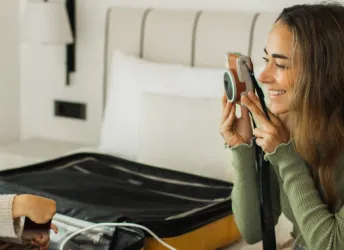How to overcome travel anxiety


Medically reviewed by Dr. Joel Lockwood MD, FRCPC, Regional Chief Medical Officer at Zurich Travel Assist, our 24/7 assistance provider.
There’s a lot to love about travel, from discovering foreign countries and experiencing different cultures to embarking on new adventures and taking a break from your everyday life. While leaving your comfort zone on vacation can be exciting, does it sometimes make you feel anxious?
New travel experiences may leave you feeling overwhelmed. If you’re worrying about scenarios both in and outside of your control before or during your trip, you might be feeling travel anxiety symptoms.
“From navigating the barrage of security, customs, and passport control at the airport to the stresses of a cramped plane and unfamiliar environments after landing, there are many stress points for travelers,” explains Dr. Joel Lockwood MD, FRCPC, Regional Chief Medical Officer at Zurich Travel Assist, our 24/7 assistance provider.
Don’t let the fear of travel keep you from embarking on a wonderful adventure. Whether you’re a seasoned traveler or yet to get your first passport stamp, our helpful guide can show you how to deal with travel anxiety by helping you understand why anxiety about traveling occurs and how to manage it yourself before your next trip.
Jump to:
- What's anxiety?
- What's travel anxiety?
- What causes travel anxiety?
- What travel anxiety symptoms should I watch out for?
- How to deal with travel anxiety
- How we can help support anxious travelers
What's anxiety?
Generalized anxiety is a common mental health condition that can affect the way you think, feel, and behave. “Often related to an event with an uncertain outcome, anxiety is a feeling of worry, nervousness, or apprehension, which is the body's physical response to a threat or perceived threat,” explains Dr. Lockwood.
What's travel anxiety?
Travel anxiety is the feeling of fear or stress caused by travel. It may occur before traveling, during a trip, or after you’ve returned home. Even if you don’t have a history of anxiety or suffer from generalized anxiety, you may still find aspects of travel stressful and suffer from travel anxiety symptoms.
What causes travel anxiety?
There are a lot of unknown factors involved in traveling, which can lead to people feeling anxious on vacation.
“Symptoms often worsen in uncertain situations — and traveling only exacerbates this,” notes Dr. Lockwood. “But it’s not only generalized anxiety sufferers who will notice increased levels of uneasiness when traveling … other travelers may experience anxiety, too.”
Dr. Lockwood says the causes of travel anxiety symptoms can vary from person to person: “Being in a confined space on a plane, crowded airports, unfamiliar environments, or even traveling through non-English speaking countries where signage and communication may be difficult to understand are all potential stressors.”
3 stages when travel anxiety can happen
Travel anxiety can strike at any time during your trip — even in the early planning stage.
1. Before your trip
As you begin to research your intended destination, the sheer number of options, such as where to go, what to do, and the best places to stay — plus the logistics of getting from A to B — may be overwhelming and cause travel anxiety symptoms to arise.
2. During your trip
There are many moments during your trip where you could feel anxious about traveling. Regardless of how well you’ve prepared for your trip, things may not always go according to plan. Flights can get canceled or rescheduled, you might miss your tour bus, or you may get sick and unable to leave your hotel.
3. After your trip
You may be home safe and sound, but that doesn’t necessarily mean you’re immune from travel anxiety. Jet lag, returning to your regular routine, or dealing with the aftermath of things going wrong while traveling can all affect your mental health once you get home.
What travel anxiety symptoms should I watch out for?
Everyone experiences stress or anxiety differently. However, there are some common signs to be aware of.
“People suffering from anxiety may notice physical symptoms, like nervousness or restlessness, feelings of panic or ‘impending doom,’ rapid breathing and pulse, difficulty focusing, and increased sweating,” says Dr. Lockwood.
Five common symptoms of travel anxiety
1. Feelings of uneasiness
2. Panic attacks (a sudden onset of intense fear or anxiety)
3. Rapid heart rate
4. Decreased concentration
5. Sweating
“If you experience any of these symptoms that you cannot manage before leaving home, speak to your doctor,” advises Dr. Lockwood. “They’ll be able to provide expert medical advice and additional support if needed.”
If you’re already traveling and need medical assistance, contact your travel insurance provider’s emergency assistance team. If you’re a Travelex policyholder, you can tap the assistance button in our Travel On app to reach 24/7 assistance services quickly and easily.
How to deal with travel anxiety
The good news is travel anxiety doesn’t have to get in the way of you enjoying your trip
“The key to reducing anxiety while traveling is spending time preparing for all eventualities,” suggests Dr. Lockwood. “Think of what could trigger your anxiety or cause nervousness about an upcoming journey and write down a plan before your departure to better manage any triggers.”
If you’re feeling anxiety about traveling, try Dr. Lockwood's expert tips:
Before you go:
Plan a smoother trip
- Speak to your doctor or another suitable medical professional to discuss your symptoms and concerns.
- Ensure you book travel plans you’re comfortable with. For example, if you have a fear of flying, land journeys or cruises may be a more enticing option for you and allow you to enjoy your adventure.
- If you’re traveling away from loved ones, ensure they have a copy of your plans so they’re aware of travel times and where you'll be.
- Use a prebooked airport transfer service to reduce the stress of traveling to the airport.
- Get familiar with your travel itinerary. Know which airport terminal you’re going to, your check-in time, and your boarding time to make sure you can arrive at the gate in advance.
Pack wisely
- Pack at least three days before your journey to help avoid feeling rushed or worried that you forgot something once you’ve left home.
- Check the weather at your destination and your planned activities and make sure you’re organized and have packed accordingly.
- Have your full set of documents easily accessible, such as your passport, travel insurance policy details, travel assistance provider contact numbers, credit cards, and copies of your vaccination record if applicable.
- Put medications in your carry-on with a doctor’s letter, and include written instructions, if necessary.
- Pack activities to reduce stress (like a puzzle book) and bring noise-reducing headphones to listen to podcasts, music, etc.
During your trip:
- Keep hand sanitizer and/or bacterial wipes with you at all times.
- Use a guided meditation app if you start to feel anxious.
- Be mindful of your destination’s time zone and try to sleep at appropriate times to prevent jet lag.
- Make your hotel room feel safer or more comfortable by playing calming music.
- Stay in touch with friends and family back home to avoid feeling alone and isolated.
After you’ve returned:
- Regulate your sleep to minimize jet lag and excessive fatigue.
- Eat healthy foods to help ensure you stay well.
- Try to return to your pre-travel activities within a realistic time frame — there’s no need to push yourself.
How we can help support anxious travelers
When you experience travel anxiety away from home, it helps to know you’re not alone and can get support fast. If you protect your trip with one of our Travelex plans, you get access to our 24/7 travel assistance services via the phone, email, or our Travel On app. Although our plans don’t offer financial coverage for anxiety-related medical costs, our assistance provider can help you find medical care, get prescriptions, and more.
“If you know travel can leave you feeling anxious — or if you suffer from generalized anxiety that can be exacerbated by travel — don’t forget to visit your doctor or local medical professional before traveling so you can talk through your symptoms and any concerns to help reduce any on-trip issues,” suggests Dr. Lockwood.
Ease your travel anxiety with travel insurance
While you can’t control everything that comes with traveling, protecting your trip with travel insurance can help minimize your concerns about flight delays, cancellations, and more. Get a quote online now.
Material on this webpage is provided for informational purposes only and is correct at the time of writing on May 28, 2025 but may change at any time or from time to time. It is general information only and any discussion about medicine, health and related subjects may not apply to you as an individual and is not a substitute for your own doctor’s medical care or advice. The words and other content provided on this website, and in any linked materials, are not intended and should not be construed as medical advice. If the reader or any other person has a medical concern, they should consult with an appropriately licensed physician or other healthcare worker. Nothing contained on the website is intended to establish a physician-patient relationship, to replace the services of a trained physician or healthcare professional, or otherwise to be a substitute for professional medical advice, diagnosis, or treatment. The views and opinions expressed on this website have no relation to those of any academic, hospital, practice, or other institution with which the authors are affiliated. Never disregard medical advice or delay seeking medical care because of something you have read on or accessed through this website. If you think you may have a medical emergency, call your doctor or emergency services immediately.









